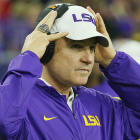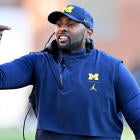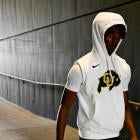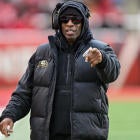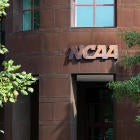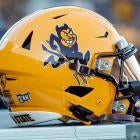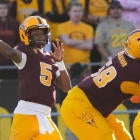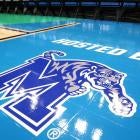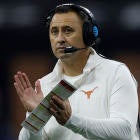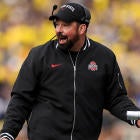Believe it or not, there used to be a time when almost every college football coach finished the season. Novel concept, right? He's your coach starting the season, and he's your coach to end it.
Maybe everyone knew the coach was going to be fired or step down when the season ended. But he finished with his team what they started -- a concept that's fundamental to competitive team sports.
Wisconsin athletic director Barry Alvarez remembers those days. When LSU fired Les Miles on Sept. 25, Alvarez felt those familiar feelings of concern about firing coaches so early in the season.
"You wonder who's making the call, where's the pressure coming from, what the sense of urgency is four games into it," Alvarez said. "If it's that bad, why wasn't the decision made the year prior? It puts your kids and staff and everybody else in a very disruptive situation and I don't know what you accomplish. I don't know how you can make decisions that early on trying to build your program."
This isn't an issue only for LSU. Across the country, more universities and coaches are parting ways fairly early in the season. Over the past four years, 16 FBS coaches have been fired or resigned before the end of October, according to a CBS Sports review of past announcements of coaching changes. That happened just 13 times from 2004-12.
Increasingly, the decisions are coming sooner. Thirteen of the 16 coaching change announcements from 2013-16 occurred before Oct. 15. Coaching changes were made that early only nine times from 2000-12. Even Florida's famous 2004 firing of Ron Zook occurred on Oct. 25, and Zook was allowed to finish the season (a dying art for coaching changes).
In-season coaching changes before November
| Year | Coach, Team | Date | Reason |
| 2016 | Les Miles, LSU | Sept. 25 | Fired |
| 2016 | Ron Turner, FIU | Sept. 25 | Fired |
| 2015 | Tim Beckman, Illinois | Aug. 28 | Fired |
| 2015 | Dan McCarney, North Texas | Oct. 10 | Fired |
| 2015 | Randy Edsall, Maryland | Oct. 11 | Fired |
| 2015 | Steve Spurrier, South Carolina | Oct. 12 | Retired |
| 2015 | Steve Sarkisian, USC | Oct. 12 | Fired |
| 2015 | Al Golden, Miami | Oct. 25 | Fired |
| 2015 | George O'Leary, UCF | Oct. 26 | Retired |
| 2015 | Jerry Kill, Minnesota | Oct. 28 | Retired |
| 2014 | June Jones, SMU | Sept. 8 | Resigned |
| 2014 | Charlie Weis, Kansas | Sept. 28 | Fired |
| 2014 | Jeff Quinn, Buffalo | Oct. 13 | Fired |
| 2013 | Lane Kiffin, USC | Sept. 29 | Fired |
| 2013 | Paul Pasqualoni, Connecticut | Sept. 30 | Fired |
| 2013 | Don Treadwell, Miami (OH) | Oct. 6 | Fired |
| 2012 | Robb Akey, Idaho | Oct. 21 | Fired |
| 2011 | Mike Locksley, New Mexico | Sept. 26 | Fired |
| 2011 | Mike Stoops, Arizona | Oct. 10 | Fired |
| 2011 | Bob Toledo, Tulane | Oct. 18 | Resigned |
| 2010 | Tim Brewster, Minnesota | Oct. 17 | Fired |
| 2010 | Todd Dodge, North Texas | Oct. 20 | Fired |
| 2008 | Tommy Bowden, Clemson | Oct. 14 | Fired |
| 2008 | Tyrone Willingham, Notre Dame | Oct. 28 | Fired* |
| 2007 | Phil Bennett, SMU | Oct. 28 | Fired* |
| 2006 | John Bunting, North Carolina | Oct. 22 | Fired* |
| 2005 | Bobby Wallace, Temple | Oct. 10 | Fired* |
| 2004 | John Robinson, UNLV | Sept. 27 | Retired* |
| 2004 | Ron Zook, Florida | Oct. 25 | Fired* |
| 2003 | John Mackovic, Arizona | Sept. 29 | Fired |
| 2003 | Todd Berry, Army | Oct. 14 | Fired |
| 2003 | Jackie Sherrill, Mississippi State | Oct. 18 | Retired* |
| 2003 | Carl Franks, Duke | Oct. 19 | Fired |
| 2002 | Bobby Keasler, Louisiana-Monroe | Sept. 18 | Resigned |
| 2001 | Charlie Weatherbie, Navy | Oct. 29 | Fired |
| 2000 | Gary Blackney, Bowling Green | Sept. 26 | Resigned* |
| * Coached out the remainder of the season | |||
So what changed? Money and pressure, like most pressure points in the commercialized world of college sports.
When FIU made Ron Turner the first coach firing of 2016, Turner had a 10-30 record and FIU was so desperate for fans that it's giving students a free tablet if they attend all seven home games this year. Turner made $605,000 a year -- a small amount compared to the millions thrown around at larger schools. But it's more than what a prominent ACC school, North Carolina, paid John Bunting when he got fired halfway through the 2006 season ($341,925 when factoring inflation).
After Miles was fired with a buyout that could be around $11 million, LSU president F. King Alexander said in a statement, "We have a duty to our student athletes, as we do all students, to put them in a position to be successful." Just call this "duty" what it really is: a business decision.
Universities (the company) and fans/boosters (the shareholders) examine whether they're getting a return on investment to keep the coach (the CEO). If the answer is no, the schools cut their losses.
Jed Hughes, vice chair of the search firm Korn Ferry, worked the search for Miami last year when Al Golden was fired midseason. Hughes said the LSU firing differs from other early-season firings because of "obvious leadership issues" that played out at the end of 2015 when Miles was almost fired.
"There was no mystery behind who the decision-makers were at Miami," Hughes said. "I think at LSU there are question marks on who's pulling the trigger, and in some ways, that could be an issue for the next coach in terms of, 'Can I really come in and work in that environment and who's running the show?'"
SEC commissioner Greg Sankey said that while the LSU and FIU firings were "obviously early in the season," each school has to make those decisions for themselves.
"I think, when Jeremy Foley has made some changes at Florida, he has remarked [that] if you're going to make that change, you've got an opportunity to provide yourself a few more weeks to prepare," Sankey said. "The recruiting cycle is more intense now. I think that's on people's mind. Sometimes you just need a change in tone around the program."
On the one hand, LSU can now be viewed as being "above board" while searching for a new coach without Miles there. The Baton Rouge Advocate reported last year that, before firing Miles, LSU started early negotiations with Jimbo Fisher's agent. LSU athletic director Joe Alleva said last week he views the rest of this season as an "audition" for interim coach Ed Orgeron, who beat Missouri 42-7 on Saturday.
On the other hand, there's no clear evidence schools automatically benefit by firing coaches early to jump in line to hire the next one. Consider some of these recent moves:
- USC fired Lane Kiffin at the airport on Sept. 29, 2013. Instead of hiring Boise State's Chris Petersen, the Trojans chose Washington's Steve Sarkisian, who was fired in 2015 when his alcohol problem surfaced publicly multiple times. Petersen now coaches undefeated Washington.
- Maryland fired Randy Edsall on Oct. 11, 2016. The Terrapins were later publicly linked with Mark Richt and Dan Mullen as possible longshot candidates. Maryland hired Michigan defensive coordinator DJ Durkin, who has shown potential with a 4-0 start.
- North Texas has twice fired coaches in mid-October during the past six years (Dan McCarney and Todd Dodge). North Texas is 2-3 this season under new coach Seth Littrell after a 6-37 record with Dodge.
- Clemson fired Tommy Bowden on Oct. 14, 2008, and made Dabo Swinney the interim coach. After some struggles under Swinney initially, this decision became the poster child as the best midseason firing. Swinney had a patient athletic director who allowed him to grow and now Clemson is one of college football's elite programs.
- Steve Spurrier resigned on Oct. 12, 2016, saying he had decided to fire himself. The Gamecocks pursued many prominent names -- Kirby Smart, Tom Herman, Justin Fuente and Rich Rodriguez -- and often got turned down. They ended up making one of the last coaching hires in the cycle by picking Auburn defensive coordinator Will Muschamp, who was previously fired at Florida. The jury remains out on that decision.
"South Carolina was late to hire because they were slow to respond," Hughes said. "There's a balance. It's not just making a change. Then how do you do it? Do you just work with the agent or do you bring someone like ourselves on board to help navigate the waters. It may look pretty simple, but the ability to get the alignment with the board, the president, the head coach, the athletic director, that has to start with what you're looking for."
South Carolina did use a search firm, Eastman and Beaudine, for its $80,000 search over 54 days. Gamecocks athletic director Ray Tanner praised the firm for helping him with his first football coaching search.
LSU will navigate finding a new coach through Alleva, who told ESPN Radio 104.5 FM in Baton Rouge, "I'm the search." Alleva has been part of a lawsuit brought against LSU by former defensive coordinator John Chavis over his contract terms. Alleva was 1 for 3 in hiring football coaches at Duke (Carl Franks and Ted Roof failed, David Cutcliffe is thriving) and 0-for-2 in men's basketball hires at LSU (Trent Johnson and Johnny Jones).
"LSU through the years has unbelievable talent in the state so there's parts about the job that are attractive," Hughes said. "But I think about any job in the SEC you've got to ask yourself, do you want to get in that war? Because it's a war. They may pay a lot of money, but week in and week out, you're banging heads with very talented teams."
The money explains why coaches are getting fired earlier in the season. That's not to say the public should necessarily feel sympathetic for coaches, who get paid handsome buyouts to not coach. But it also doesn't guarantee success, no matter the sport.
UNLV fired men's basketball coach Dave Rice last season with 15 games remaining. After efforts to land high-profile coaches like Rick Pitino and Mick Cronin, UNLV ended up with Marvin Menzies after 44 other Division I teams had hired coaches, according to Sporting News.
Once upon a time, departing football coaches used to finish the season. Between 2003-08, seven coaches who had been fired or announced their retirement by late October finished the season. No coach whose exit gets announced in September or October has stuck around since Tyrone Willingham completed a 0-12 season at Washington in 2008.
Athletic directors used to talk about maintaining order on and off the field by keeping the departing head coach in charge. That thinking has changed to the idea that keeping a lame-duck coach around isn't good for anyone. Some interim coaches have led successful turnaround seasons. USC's Clay Helton reached the Pac-12 Championship Game in 2015, and Orgeron posted a 6-2 record as the Trojans' interim coach in 2013.
Still, the trend of firing coaches early in the season simply speaks to the transactional relationships that occur in the college football industry. When a program goes south, there are recruits to pursue, new coaches to woo, press conferences to be won, and booster money to retain.
"I don't think things like [Miles' firing] surprise me but that doesn't mean I'm agreeable that it should be that way," Alabama coach Nick Saban said. "I think from a players' perspective and a program perspective, doing these kinds of things during the season probably is not the best way to go about it."
As Saban might say, it is what it is. It's anyone's guess these days if your team's embattled coach will finish the season.












